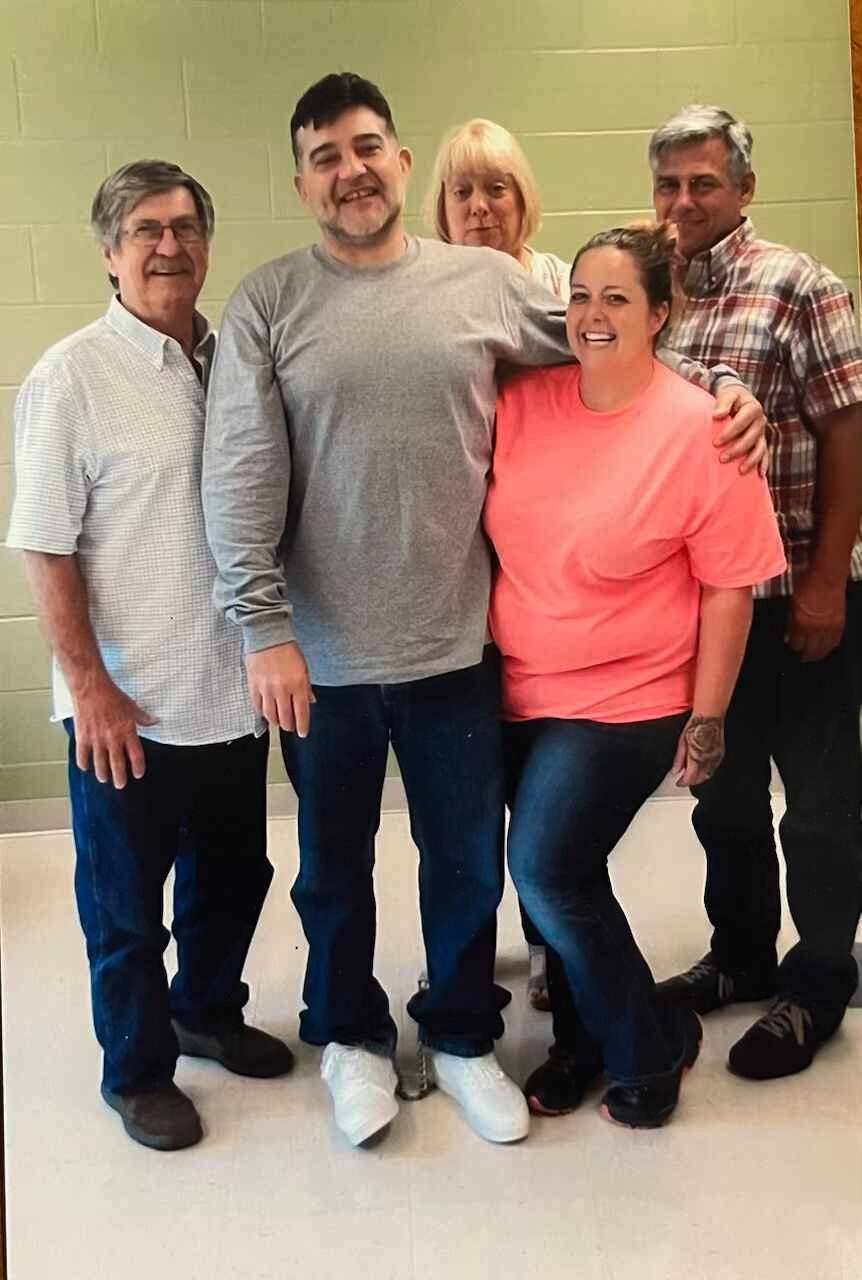- News
- World
- Americas
- US Crime News
Jimmie Duncan was convicted of murdering his then-girlfriend’s 23-month-old daughter in 1998
Jack BrookThursday 27 November 2025 16:10 GMT open image in galleryThis 2017 photo provided by Mwalimu Center for Justice shows Jimmie Duncan, second from left, with family and friends at the Louisiana State Penitentiary
open image in galleryThis 2017 photo provided by Mwalimu Center for Justice shows Jimmie Duncan, second from left, with family and friends at the Louisiana State Penitentiary
The latest headlines from our reporters across the US sent straight to your inbox each weekday
Your briefing on the latest headlines from across the US
Your briefing on the latest headlines from across the US
 Email*SIGN UP
Email*SIGN UPI would like to be emailed about offers, events and updates from The Independent. Read our Privacy notice
A Louisiana inmate who spent nearly three decades on death row has been released on bail after his conviction was overturned.
Jimmie Duncan was convicted of the first-degree murder of 23-month-old Haley Oiveaux, the daughter of his then-girlfriend Allison Layton Statham, in 1998.
Prosecutor accused him of raping and drowning the toddler.
But Fourth Judicial District Court Judge Alvin Sharp threw out that conviction in April after hearing expert testimony that the forensic evidence which put Duncan behind bars was “not scientifically defensible.”
Instead, Haley’s death appeared to be the result of an “accidental drowning,” the judge heard.
Similar faulty forensic bite mark analysis has led to dozens of other wrongful convictions or charges.
“The presumption is not great that he is guilty,” Sharp wrote in his order granting Duncan bail, delivered Friday.
Sharp cited the new evidence presented at an evidentiary hearing in 2024 and Duncan’s lack of prior criminal history.
 open image in galleryDuncan was held on death row at Louisiana State Penitentiary (AP)
open image in galleryDuncan was held on death row at Louisiana State Penitentiary (AP)Duncan’s attorneys said in a statement that Sharp’s ruling earlier this year provided “clear and convincing evidence showing that Mr. Duncan is factually innocent.”
They added that Duncan's release on bail “marks a significant step forward for Mr. Duncan’s complete exoneration.”
Since 1973, more than 200 people on death row have been exonerated, including 12 people in Louisiana, according to the Death Penalty Information Center.
In Louisiana, which has one of the highest wrongful conviction rates in the nation, the last death row exoneration came in 2016. Earlier this month, a man who served decades in prison before being exonerated won election to serve as the chief recordkeeper of New Orleans’ criminal court.
Duncan, whose vacated conviction is still being reviewed by the Louisiana Supreme Court, was released after posting a $150,000 bond. He plans to live with a relative in central Louisiana.
Louisiana Attorney General Liz Murrill, who is pushing to hasten executions of death row inmates, said that Duncan should not be released on bail while the Louisiana Supreme Court reviews his case.
But the high court agreed to let a district judge rule on Duncan’s bail request.
Toddler’s mother blames prosecutors
During Duncan’s bail hearing in Ouachita Parish, the mother of the girl he was accused of killing told the judge that she had become convinced of Duncan’s innocence. Instead, Statham believed her daughter, who she said had a history of seizures, had accidentally drowned in a bathtub.
Her daughter “wasn’t killed,” Statham said according to court records. "Haley died because she was sick.”
Statham told the court that the lives of her family and Duncan “have been destroyed by the lie” she believed prosecutors and forensic experts had concocted.
Prosecutors had relied on bite mark analysis and an autopsy conducted by two experts later linked to at least 10 wrongful convictions, according to Duncan’s legal team, which described the pair as discredited “charlatans.”
Mississippi-based forensic dentist Michael West and pathologist Steven Hayne examined Oliveaux’s body.
A video recording of the examination shows West “forcibly pushing a mold of Mr. Duncan’s teeth into the child’s body — creating the bite marks” later used to convict him, a court-filing from Duncan’s legal team stated. A state-appointed expert, unaware of this method, testified during trial that the bite marks on the body matched Duncan’s.
“The horror story that they put out and desecrated my baby’s memory makes me infuriated," Statham said.
“I was not informed of anything that would have exonerated Mr. Duncan at all,” she added. “Had I been then, things would have turned out a lot different for Mr. Duncan and all of our families.”
‘Junk science’
An Associated Press review from 2013 found at least two dozen wrongful convictions or charges based on bite mark evidence since 2000.
“Bite mark evidence is junk science, and there is no more prejudicial type of junk science that exists than bite mark evidence,” M. Chris Fabricant, an Innocence Project lawyer representing Duncan, told the court during the bail hearing.
Hayne, the pathologist, is deceased. West has previously said that DNA testing has made bite mark analysis obsolete, yet he has defended his work in other cases that led to overturned convictions.
The pair's testimony led two Mississippi men, Levon Brooks and Kennedy Brewer, to serve a combined three decades in prison in two separate cases for the rape and murder of young girls until DNA evidence cleared them of the crimes.
Prosecutors still seek death penalty
Prosecutors are seeking to reinstate Duncan’s conviction and pointed to the 1994 grand jury indictment in his case as grounds for keeping him locked up, court records show.
The office of Ouachita Parish District Attorney Robert Tew declined to comment, citing the Louisiana Supreme Court’s pending review.
Duncan was one of 55 people on death row in Louisiana, held at the state prison in Angola. After a 15-year hiatus, Louisiana carried out its first execution in March.
Duncan’s legal team described him as a “model prisoner” who helped other death row inmates obtain their GEDs and has “strong community support for his release.”




